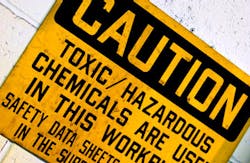There should be stricter rules on and control over chemical safety globally if governments and authorities want to protect children from potential brain damage caused by chemical exposure, scientists have warned.
Over the past few years there has been a "silent epidemic" of adverse health effects caused by chemical exposure, with the number of recognized chemical causes of brain development conditions doubling since 2007. In addition, there are many chemicals that are known to have a negative effect on development but whose use in children's products has not been regulated, two U.S. scientists have claimed.
RELATED: EPA to fund research into chemical exposure on brain development
These chemicals can be found in many consumer products to which children have free access, such as clothes, toys and furniture, said Dr. Philippe Grandjean of the Harvard School of Public Health in Boston and Dr. Philip Landrigan of Mount Sinai School of Medicine in New York. They are urging lawmakers to introduce tough regulation that will prohibit the use of these chemicals in manufacturing and will require companies to prove that the chemicals they use in industrial production are non-toxic.
Such rules are already in force in the European Union, where the Registration, Evaluation, Authorization and Restriction of Chemicals (REACH) law is in force, but unless similar restrictions are applied worldwide people will be living at risk of a "pandemic of neurodevelopmental toxicity," Dr. Grandjean explained in the study, published in the Lancet Neurology journal.
